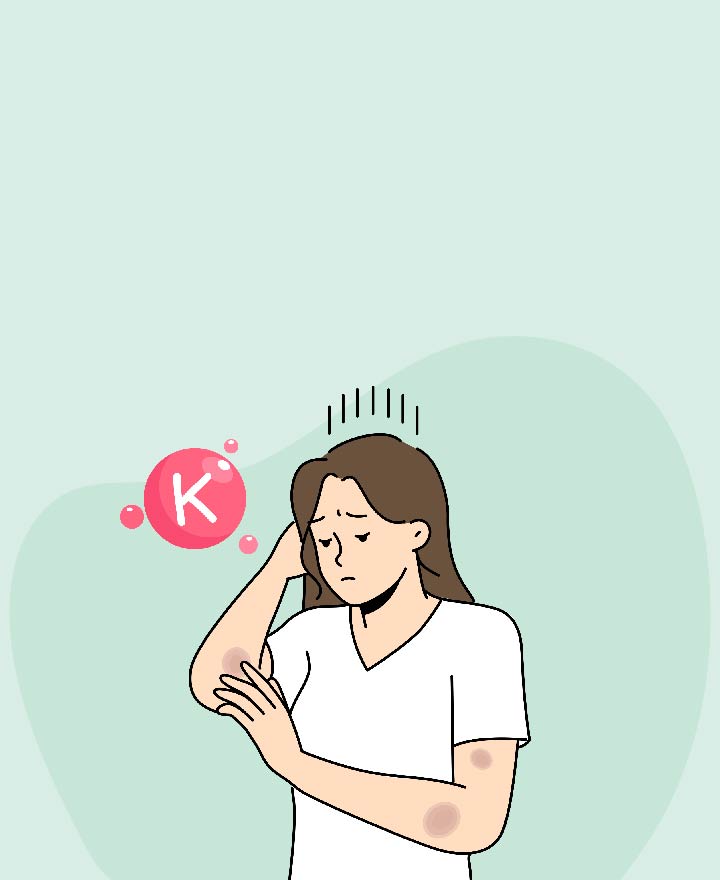

Vitamin K Deficiency – Causes, Symptoms, and Treatment
Vitamin K is an essential vitamin required for forming blood clot after injury. It is also essential for bone health as it helps the body with calcium absorption. If the body doesn't receive enough vitamin K through food, you may suffer from Vitamin K deficiency which can cause further health issues. Take a look at the article to learn about Vitamin K deficiency causes, symptoms and treatment options.
Importance of Vitamin K
Vitamin K plays an important role in coagulation, better understood as blood clotting, which is a process that helps prevent excessive bleeding when hurt. There are two main kinds of vitamin K:
- Vitamin K1 (phylloquinone) which comes from plants, especially leafy green vegetables like spinach and kale.
- Vitamin K2 (menaquinone) which is naturally created in the intestinal tract and works similarly to K1.
Both vitamin K1 and vitamin K2 produce proteins that help the blood clot.
The deficiency of this vitamin results in excessive bleeding because the body is unable to form the clot. The bleeding can occur anywhere in the body, both inside and outside, making it difficult to notice in cases of internal bleeding.
While Vitamin K deficiency is rare in adults, it is much more common in infants.
Vitamin K Deficiency Symptoms
The main symptom of vitamin K deficiency is excessive bleeding. The bleeding may also be apparent if someone:
• bruises easily
• gets small blood clots underneath their nails
• bleeds in mucous membranes that line areas inside the body
• produces stool that looks dark black (almost like tar) and contains some blood
In infants, vitamin K deficiency symptoms include:
• bleeding from the area where the umbilical cord is removed
• bleeding in the skin, nose, the gastrointestinal tract, or other areas
• bleeding at the penis if the baby has been circumcised
• sudden bleeding in the brain, which is extremely dangerous and life-threatening
Vitamin K Deficiency Causes
While this deficiency is rarely seen in adults, they are at an increased risk of suffering from it if they:
• take blood thinners, or anticoagulants, which prevent blood clots but inhibit vitamin K activation
• take medications that interfere with vitamin K production and absorption
• do not get enough vitamin K through their diet
• take extremely high doses of vitamin A or E
• Suffering from certain medical conditions like celiac disease, cystic fibrosis, or an intestinal disorder
Daily Requirement of Vitamin K
It is recommended that adults get the following amounts of vitamin K each day:
• 120 micrograms (mcg) for males
• 90 mcg for females
Vitamin Deficiency in the Long Run
Vitamin K deficiency can have some adverse effects in the long run, like:
• Vitamin K deficiency in adults
If left untreated, vitamin K deficiency in adults can lead to excessive bleeding, which may become life-threatening. However, with timely intervention, most cases of deficiency can be effectively treated.
• Vitamin K deficiency in infants
In infants, when vitamin K deficiency bleeding (VKDB) is diagnosed and treated promptly, the prognosis is generally positive. However, if the bleeding progresses into an intracranial haemorrhage and is not addressed quickly, it can result in serious complications, including brain damage or even death.
Vitamin K Deficiency Treatment
If a person develops a vitamin K deficiency, the healthcare provider prescribes vitamin K supplements. While supplements are usually taken orally, they can also be injected if your body is less able to absorb the supplement by mouth. A doctor, as part of Vitamin K deficiency treatment will also consider whether a person is taking anticoagulants, as these can interact with vitamin K.
Ways to Prevent Vitamin K Deficiency
The best and the most effective way to prevent Vitamin K deficiency is by eating a well-balanced diet including food rich in Vitamin K. Include a lot of green vegetables like spinach, kale and broccoli in your daily diet. Also, have whole grains, soybean oil and eggs to stay nourished. Encourage your children to eat these foods right from the time they are ready to eat solids.
Conclusion
Vitamin K deficiency in adults is very rare, as most people get sufficient vitamin K from their diet. If a deficiency does develop and remains untreated, it may result in excessive bleeding. A diet high in foods that contain vitamin K can help prevent vitamin K deficiency. It is also important to understand vitamin K deficiency causes and symptoms for timely medical intervention and better outcomes.
One of the important components of our overall wellness is also being financially secured. Healthcare emergencies can happen any time, but a good health insurance can protect you from such uncertain situations. To know more about it, click here
Source: Healthline, MedicalNewsToday
Disclaimer: This blog provides general information and discussions about health and related subjects. The information and other content provided in this blog, website or in any linked materials are not intended and should not be considered, or used as a substitute for, medical advice, diagnosis or treatment. Kindly contact your Doctor before starting a new medicine or health regime.
Related Articles
Food to Eat & Avoid To Overcome Vitamin B12 Deficiency
Iodine Deficiency and its Consequences
Signs of Vitamin Deficiency in Kids
Signs and Symptoms of Protein Deficiency
Common Nutritional Problems in India
Published on March 29, 2023
Last updated on April 01, 2025

















 Health Insurance
Health Insurance  Travel Insurance
Travel Insurance  Car Insurance
Car Insurance  Cyber Insurance
Cyber Insurance  Critical Illness Insurance
Critical Illness Insurance
 Pet Insurance
Pet Insurance
 Bike/Two Wheeler Insurance
Bike/Two Wheeler Insurance  Home Insurance
Home Insurance  Third Party Vehicle Ins.
Third Party Vehicle Ins.  Tractor Insurance
Tractor Insurance  Goods Carrying Vehicle Ins.
Goods Carrying Vehicle Ins.  Passenger Carrying Vehicle Ins.
Passenger Carrying Vehicle Ins.  Compulsory Personal Accident Insurance
Compulsory Personal Accident Insurance  Travel Insurance
Travel Insurance  Rural
Rural